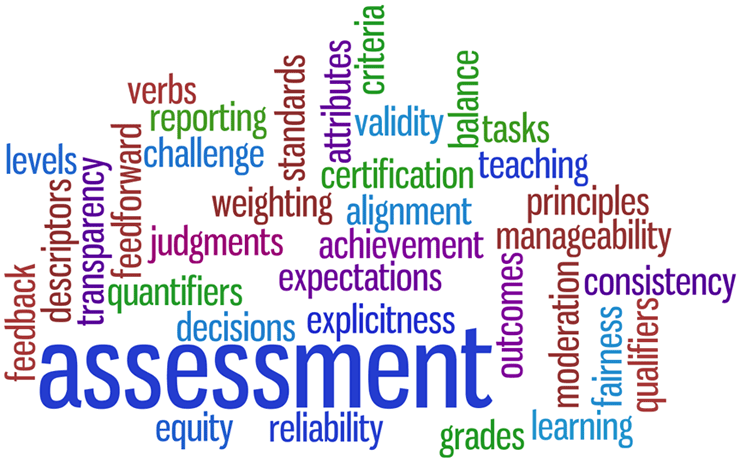 I have just finished grading final exams for high school sophomores, and I can’t help but wonder if I am guilty of cheating. Balancing high standards with opportunities for retakes shapes my approach to developing assessments. In my view, a student who fails one section of multiple choice should have the opportunity to write more in an essay or short answer section. But I worry that if I do not fail enough students my testing practiced will be scrutinized with accusations of test score inflation and manipulations. I must be devious if I can figure out a method for helping students to succeed.
I have just finished grading final exams for high school sophomores, and I can’t help but wonder if I am guilty of cheating. Balancing high standards with opportunities for retakes shapes my approach to developing assessments. In my view, a student who fails one section of multiple choice should have the opportunity to write more in an essay or short answer section. But I worry that if I do not fail enough students my testing practiced will be scrutinized with accusations of test score inflation and manipulations. I must be devious if I can figure out a method for helping students to succeed.
Browsing Internet news sites has been interesting. A flurry of articles confirm cheating in D.C. and 37 states. Indictments against 35 teachers, administrators and principals of systematic fraudulence lauded those who undermined this conspiracy and chastised others for not catching criminals sooner. It seems that there is a war between those who want Americans to value the honor and dignity of a test score as a final testament and those who know and fear that testament. News reports confirm the measures to which many have taken even sympathizing with the reasons driving the inaccurate reports of failure. But when has there been a nationwide reporting of those who refuse to allow students to fail? Publicizing failure is too easy but publicizing the myriads of methods utilized to help schools succeed is a feature of real interest to me. It might be the reason why I avoid headline news and head for blogs and Twitter.
When I was in high school I failed a class. Ashamed and frustrated, I changed the grades on my report card but my mom saw the truth after that paper went through the wash. My parents dropped me from advanced academic tracking and put me under strict supervision all summer. I didn’t mind knowing I had failed the tests in this course but what bothered me was that I had no other means to express what I had learned. I was anchored to failure by a single score. Why was it so necessary to fail me? Why did daily attendance and participation count for so little? I never minded knowing that I wouldn’t be a scientist when I grew up but I did mind knowing that I would always be fighting that label of failure.
Now as an educator, I am held responsible for assessments based on final exams worth 20% of a semester grade. Our school and surrounding schools are experimenting with school-wide grade recovery programs, and in the meantime I’m experimenting with modifications. Students take a portion of their exam online from a standard bank of multiple choice questions and another portion from a bank of short answer questions. They can refer to document sets as evidence or they can reference their notebooks. And they can opt to take the multiple choice exam twice, highest score recorded. The established point total is 10 points higher than the score on the multiple choice requiring all students to answer at least 3 short answer questions. Those who hope to improve their score total can by addressing as many questions as they deem necessary. Students utilized instant response scoring on the multiple choice section. Our Haiku platform allows me to open and close the privacy on the test. And most students had a day between retakes to reorganize their notes, ask clarifying questions and study.
Only two students have failed and six scored 100% out of my 40 students total. Students who studied or met with me knew their content, had memorized many facts but were at a lost due to their low reading comprehension. The multiple choice questions and the constricted responses made it difficult for them to process the right answer. These same students who knew that Eisenhower had intervened during the Little Rock Nine were humbled by the way in which the answer was presented. “Pivotal” and “consequential” were terms that caused them to slow down in their processing. Students who sat reading each question out loud took time to ask me to reword the question in student friendly terms. The second time through on these questions most students whisked through without hesitation. I wouldn’t say that students gained high levels of cultural familiarity with the nature of the questions but the second opportunity with a difficult question allows for that interactive and active processing that does engage a reader.
If they were cheating they would have had perfect scores. They would have followed a pattern of similar response. What took place was different. Students achieved a score that gave them satisfaction, or a score that allowed them to prove one last time that they knew something. It appealed to that gaming mentality which rewards a second try. Many of my students will walk away from this test without home environments that provide reading in different contextual levels. They do not consider their home skills to necessarily be honed by literary improvements. Those entering our technical center programs are already putting up a fuss over whether or not they should have to participate in the English department’s summer reading program and the tech center is encouraging their exemption.
Tests measure learning as if it is solely a single experience with a single answer presented in a single context. There is no plurality despite efforts to acknowledge differentiated learning. So teachers who accommodate students may be driven to desperate measures, creative measures… Or maybe they are like me, trying to establish comprehensive measures of what they know instead of measuring what they know not.






I love the last paragraph! A test score should be one of many snapshots of a learner’s mastery of content, their ability to analyze, apply, and synthesize. I applaud your efforts to accommodate and for your emphasis on what students know and what they are doing right. I wish the powers-that-be would evaluate and ask teachers the same!